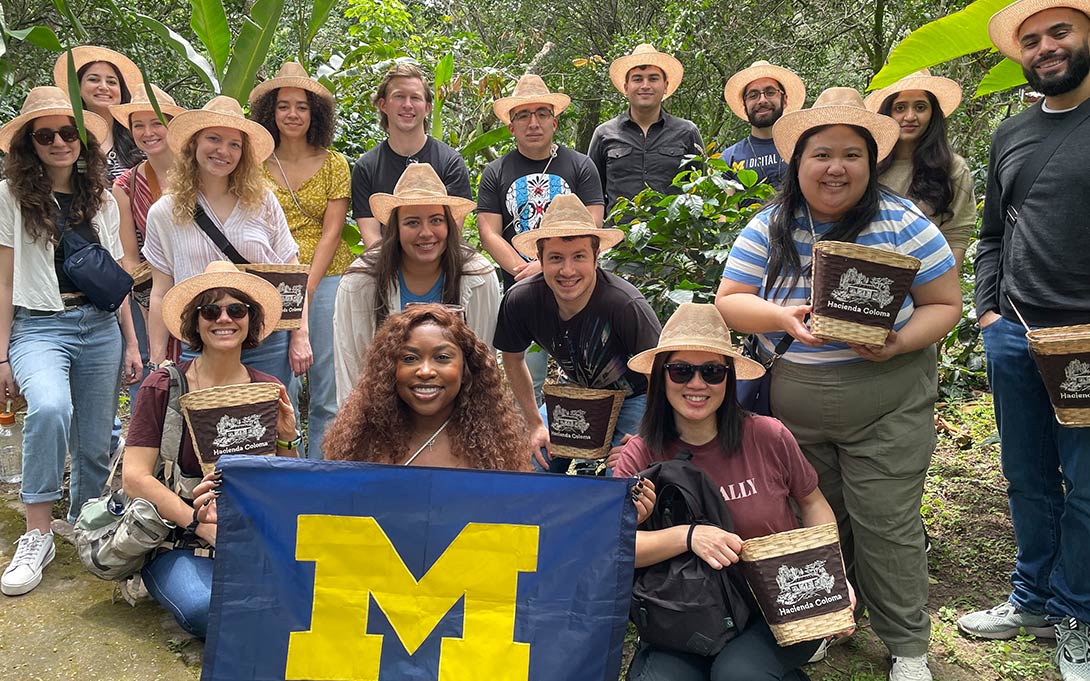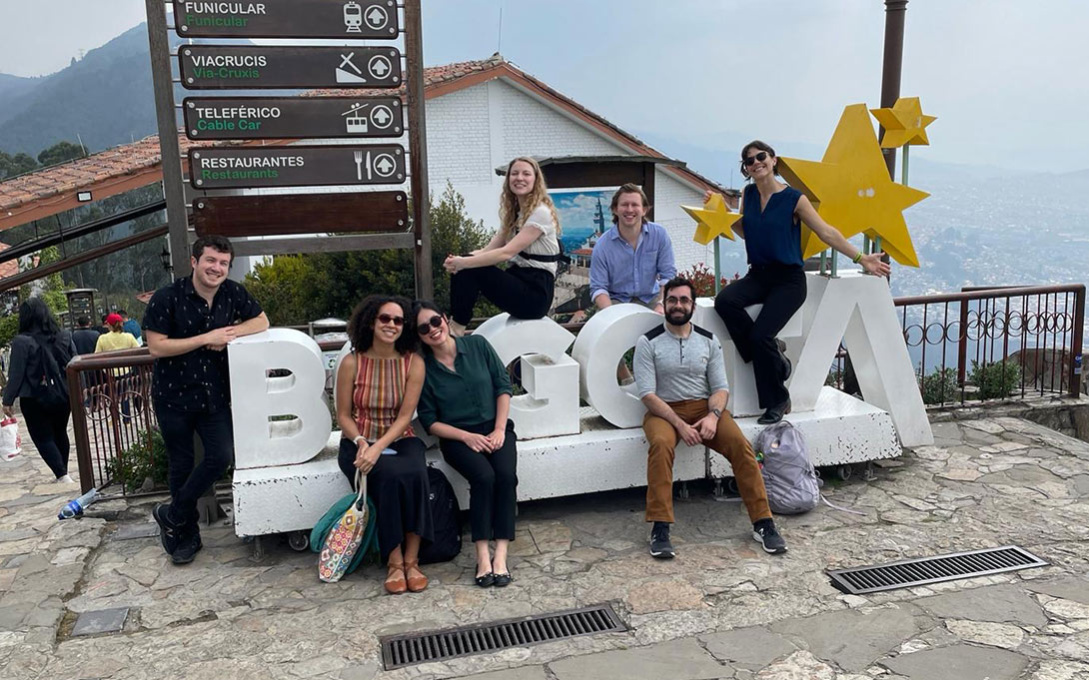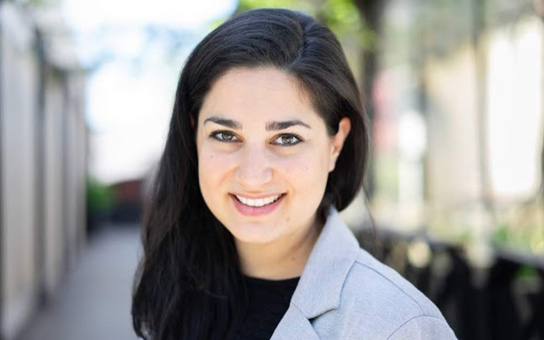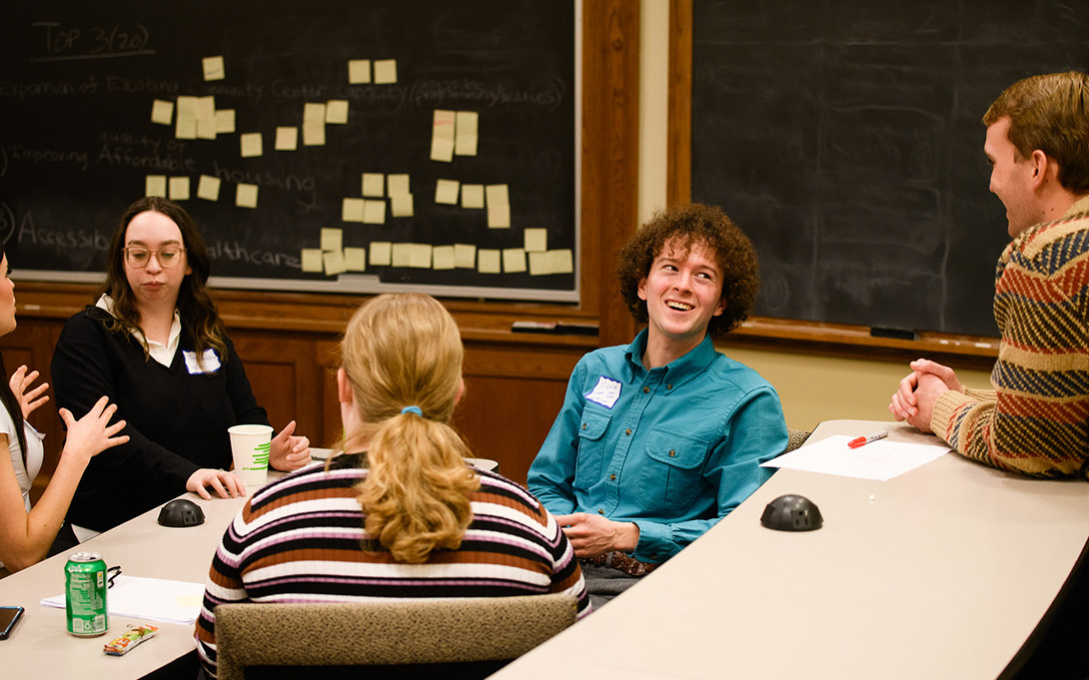
Before becoming an academic, Ford School Lecturer Amy Beck Harris worked in international development and foreign assistance implementation across Latin America with Chemonics International, the largest international development firm that implements foreign assistance programs, primarily for the U.S. Agency for International Development (USAID).
Working with both international donors and on-the-ground experts gave Harris an interesting perspective into the “how” of international development—one that is understudied in academia. In particular, she found that even though aid agencies wanted to engage beneficiaries in decision-making, they faced significant barriers; Harris returned to academia to study this issue.
Now, Harris is relying on her work experience and to give students at the Ford School a first-hand look into international development and participatory processes.
This year, she taught the International Economic Development Program (IEDP), a seven-week course where students learn about the practical realities of policy topics within a chosen country, culminating in a week-long trip to learn from and collaborate with key stakeholders. This year, the class focused on U.S. foreign assistance in Colombia.

Harris also led this year’s Integrated Policy Exercise (IPE), the annual Ford School multi-day simulation where students immerse themselves in an issue by taking on the perspectives of policy experts under "real-world" time constraints and pressures. Students portrayed citizens of Guadalajara, Mexico as they came together to decide how to spend new community development funding.
For both classes, Harris drew upon her work experience and research to give students an inside look at the international development and public participation landscapes.
“Through these learning experiences, we’re asking important questions,” Harris said. “How do we give local actors a say in the aid or government support that they’re receiving? And how do we give students tangible skills to go out in the field and make a real difference?”
A mission to educate
Harris, who earned a bachelor’s degree in international studies from Middlebury College and master’s degree from the Monterey Institute of International Studies, worked at a project manager at Chemonics International, where was responsible for programmatic implementation and oversight, liaising between U.S. government donors and on-the-ground implementation teams, supporting in-country project, and helping develop proposals for upcoming foreign assistance work.

She also served as the communications specialist and management consultant for a program funded by the World Bank Global Environment Fund and International Finance Corporation that sought to protect biodiversity within large-scale agricultural production.
After working on projects across Latin America, she returned to the University of Washington’s Evans School of Public Policy and Governance for her Ph.D.
“I came back to academia because, after working on the ground, I had a lot of questions about how international aid is managed,” she said. “Everyone has big plans for participatory development, but I could see the things that undermined this goal.
I wanted to understand, if foreign aid is delivered through these top-down structures and participatory development is a bottom-up structure, how can we better integrate them? I wondered if those processes could truly coexist within foreign assistance work.”
For example, donors often want to see speedy results from their programs, Harris said, even though including local voices in the decision-making process takes more time. There are also constraints embedded in the outsourcing process; a contract or grant can be earmarked to create jobs in specific sectors to advance donor national priorities, even though a specific community may be interested in a different sector. And often grassroots groups need to demonstrate the financial management capacity to receive grants, which ends up excluding many smaller, more community-based or grassroots organizations from receiving funds.
“There are so many local organizations who are incredibly hard-working, but also incredibly under-resourced, even when they are working with these big international aid organizations” she said.
Harris’s doctoral work explored the role of participatory development within top-down foreign assistance funding, focusing on the management tools and bureaucratic constraints that shape participatory experiences and outcomes. “My goal is to share what I learned and offer students the types of experiences they need to get hired in the industry,” she said.
Hands-on international development
This year’s IEDP centered around the USAID/Colombia Venezuela Response and Integration Program (VRI). Through the VRI program, the U.S. government is supporting the Colombian government’s response to the nearly 3 million Venezuelan migrants now in Colombia. This includes legally registering them, providing education, health, and social services, ensuring they have access to economic opportunities, and reducing xenophobia.
In the seven-week class, students learned about the history and politics of Colombia, the current crisis facing Venezuelan citizens, the resulting migration crisis, and the Colombian government’s response.
At the end of February, the class traveled to Bogota, where students had the opportunity to view the VRI program through four vantage points: the USAID director currently overseeing the program, the USAID director that supported the initial design and contracting processes, the Chemonics team contracted to implement the program, and local grassroots organizations that receive assistance through the project.
Relying on her deep professional networks and experience in Colombia, Harris incorporated a new partnership model, where students worked closely with local organizations. In previous IEDPs, students had conducted interviews to research a specific policy question, but did not work closely with local organizations or support a specific project.
“The class was based on the principle of 'bidirectionality', a concept from study travel and experiential learning research that says that the students should not be the only ones to benefit from the study travel, but also those they interact with,” Harris explained.
During their trip, the students spent more than half of their time collaborating with the local grassroots organizations, primarily founded and led by leaders within the Venezuelan migrant community in Bogota. For three days, they engaged in intensive discussions on programmatic and budgetary development, data management, funding strategy, and communications plans. Students then worked to deliver specific products to organizations including grant proposals, targeted donor guides, and suggested data management plans. The groups also shared stories, experiences, culture, food, and dance; Harris recalls much laughter and connection.
The students also met with Colombian domestic actors focusing on community development to understand differences between external assistance and domestic development work. This included the Bogota Mayor’s office of Rural Economic Development and Food Supply and several respected non-profits within the capital.
“It was a tremendous learning experience,” Harris said. “The students learned about international development from many perspectives—the funders, local officials, and people on the ground. There was also true connection and friendship developed between the students and the local organizations. One organization shared that they felt they found people with shared goals of making the world a better place.”
A model of participatory learning
In January, Harris took the lead in teaching IPE, which this year focused on community development and public participation in Guadalajara, Mexico. Students imagined the city, which celebrated its 500th birthday last year, received a large anonymous donation to spend on community development with the caveat that how to spend it had to be decided via a formal participatory process.
Harris assigned roles as municipal government leaders, participation facilitators, community members, non-profit professionals, and international development experts to about 100 students. Their challenge was to collaboratively decide how to spend the city’s donation.
This year, Harris added a new element to IPE: half-day of workshops at the end of the program focused on skill building for equity-focused design. Students chose between workshops presented by experts from around the country focused on instilling equity into policy design and implementation within different policy contexts.

Workshops built skills such as conducting gender analyses for international programming, racial equity impact assessments, understanding and navigating power inequities within foreign assistance, analyzing and advancing equity within public budgeting processes, and public participation design. Workshop leaders included Ford alum, Niketa Brar, founding director of Chicago United for Equity in collaboration with Jianan Chi, the president of the Chicago Board of Education; international development professional and international DEI consultant Farah Mahesri; Ford alumnae Amanda VanDort, now the Division Chief for Policy, Planning, and Public Diplomacy at the U.S. Department of State; current and former Brighton City Managers Gretchen Gomolka and Nate Geinzer, Ford’s Dr. Stephanie Leiser; and Harris herself.
“Public participation and participatory development are often thought of as key tools in advancing equity,” Harris said. ”IPE showed that even when we use these tools, underlying power structures within communities often dominate decision-making processes and outcomes.
“From an education perspective, part of my goal is for students to see this dynamic in action. But, after experiencing this through simulations, students are often left with, ‘Now what do we do?’ The workshops were designed to give them some different tools as they think about how they might respond to what they experienced and learned,” she said.
View all photos from this year's IPE.
Written by Sheri Hall
More news from the Ford School